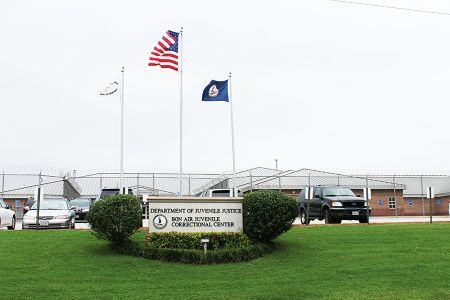Introduction

Virginia Department of Juvenile Justice/www.djj.virginia.gov
A bipartisan alliance in Virginia has launched a campaign to cut the number of students arrested by police at schools and reduce the number of juveniles held in large youth prisons in that state. The alliance cites a recent Center for Public Integrity investigation into students arrested and sent to courts in Virginia as evidence supporting a need for statewide and local reforms.
Conservative and progressive participants of the new Rise for Youth campaign are urging schools to stop putting students into the justice system for minor misbehavior, and to clarify the role of school police and their training requirements. Another idea is to persuade lawmakers to exempt children from disorderly conduct criminal codes while at school.
During a press call Thursday, the group of civil rights, religious and fiscal-reform activists also recommended reforming Virginia’s mandatory felony larceny charge that must be imposed for the theft of anything worth $200 or more — a mandate imposed on children, too.
The alliance is pushing for more funds to be dispersed locally to pay for alternatives to locking up lower-level juvenile offenders in big state detention centers. Researchers have found Virginia’s juvenile prisons to be costly breeding grounds that encourage worse behavior and lead to re-arrest rates of former wards of 80 percent.
In April, the Center and Reveal, an investigative public radio program, reported that data for the 2011-12 school year showed that Virginia’s schools collectively had the nation’s highest rate of referring students to law enforcement agencies in the country. African-American and special-needs students were disproportionately referred to cops and courts in Virginia as they were nationwide.
“This is not a statistic that I think any state in America would want to be number one for,” said Craig DeRoche, a former Republican state legislator from Michigan, who directs the Justice Fellowship, a group in the alliance. The group is the policy arm of the Virginia-based Prison Fellowship, a ministry founded by convicted Watergate conspirator Chuck Colson.
DeRoche said that in Virginia “there have been some zealous zero-tolerance policies that have resulted in criminalizing everything from playground skirmishes to handcuffing fifth graders for disorderly conduct violations.”
He was joined in the call by Virginia police and children’s rights representatives.
In September, the Justice Fellowship published a report, Juvenile Justice Reform in Virginia. The study was co-authored by the conservative national Right on Crime group, which argues that incarceration costs must be reduced, and the Virginia-based Thomas Jefferson Institute for Public Policy, which promotes limited government.
Virginia’s rate of referral of students to law enforcement agencies, which the Center found to be double the national average, “merits review,” the report says. “This initial contact with the juvenile-justice system can result in stigma and exposure to other youth with more serious records, which can fuel progressively increased involvement with the system.”
The Center investigation cited a sampling of recent local police data in Virginia showing that most of arrests of schoolchildren are for low-level charges of disorderly conduct or simple assault — and they often involve middle-school kids.
One of these students interviewed by the Center, Kayleb Moon-Robinson, is an autistic African-American boy who was 11 years old last fall when he was charged with disorderly conduct for kicking a trash can at his middle school in Lynchburg, Va. Kayleb was also arrested, handcuffed and charged with felony assault on a police officer after he struggled to break free from a school cop who grabbed him around the torso in a hallway after the sixth-grader left class without permission.
Virginia public defender Linda McCausland told the Center that she has defended middle-school kids charged with three to four charges — including obstruction of justice — for clenching fists and trying to get away from officers who grab them during school fights.
McCausland had an 11-year-old client with documented mental-health problems who was automatically charged with felony theft when she stole a teacher’s cell phone, which was estimated at a value of more than $200. A charge like felony larceny can put a child into detention, McCausland said.
More than one-third of the wards in Virginia’s two big youth prisons in 2014 were placed there for felonies that were not committed against a person — such as felony theft — and more than 11 percent were admitted for misdemeanors, according to the Juvenile Justice Reform in Virginia report.
Kate Duvall, attorney at the Legal Aid Justice Center in Virginia — also a member of the new alliance — said during the press call that she had a client who was sent to juvenile jail because he was on probation for an offense and violated it by taking a cell phone to school without permission. The boy had untreated mental-health needs, she said.
Sheriff Gabe Morgan of the Virginia city of Newport News said that he supports reforms because kids put into lock-up for relatively minor offenses “are influenced the wrong way” and more likely to become adult offenders. He said there are a range of community programs that appear to be effective at treating minors in trouble. He also said his police department recently joined with school staff to undergo retraining for how to better work with children at schools.
Read more in Education
Criminalizing Kids
When schools call police on kids
Schools refer tens of thousands of students to law enforcement every year. Black children and students with disabilities get the brunt of it.
Criminalizing Kids
Our reports show why school police are under fire after Floyd protests
Districts removing cops or considering it after Black Lives Matter marches

Join the conversation
Show Comments